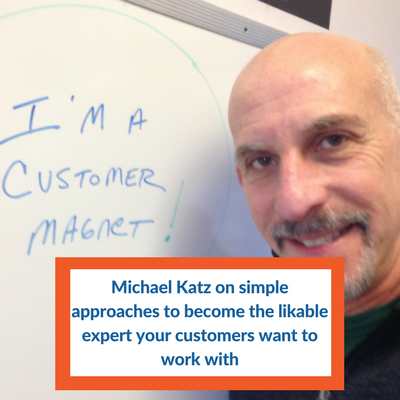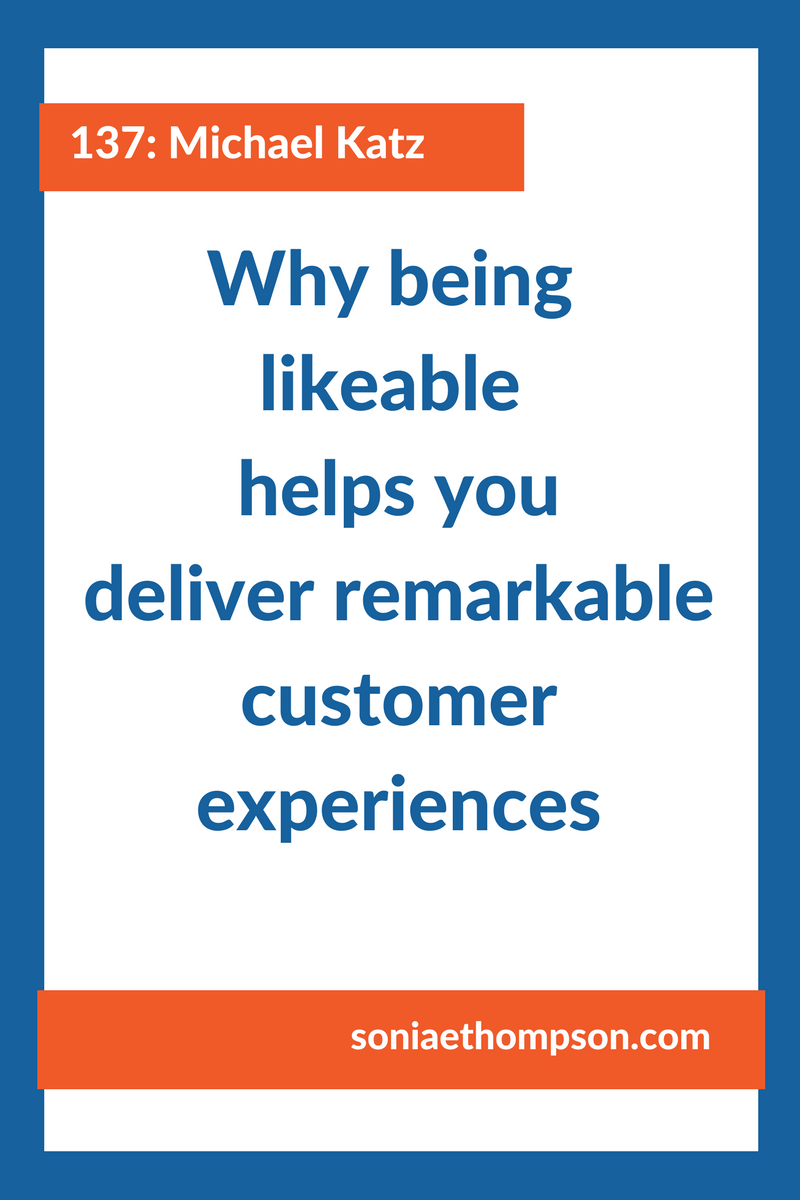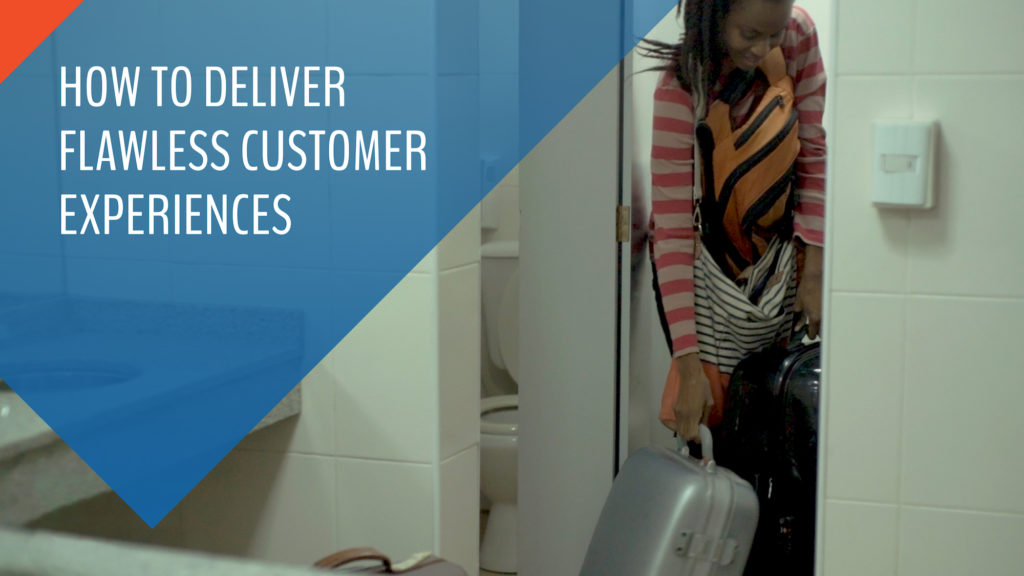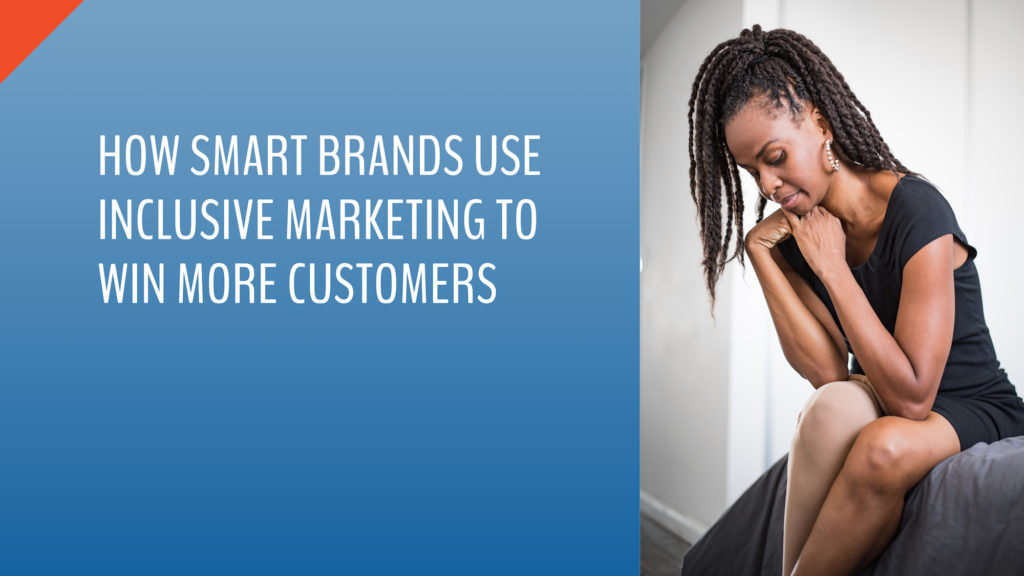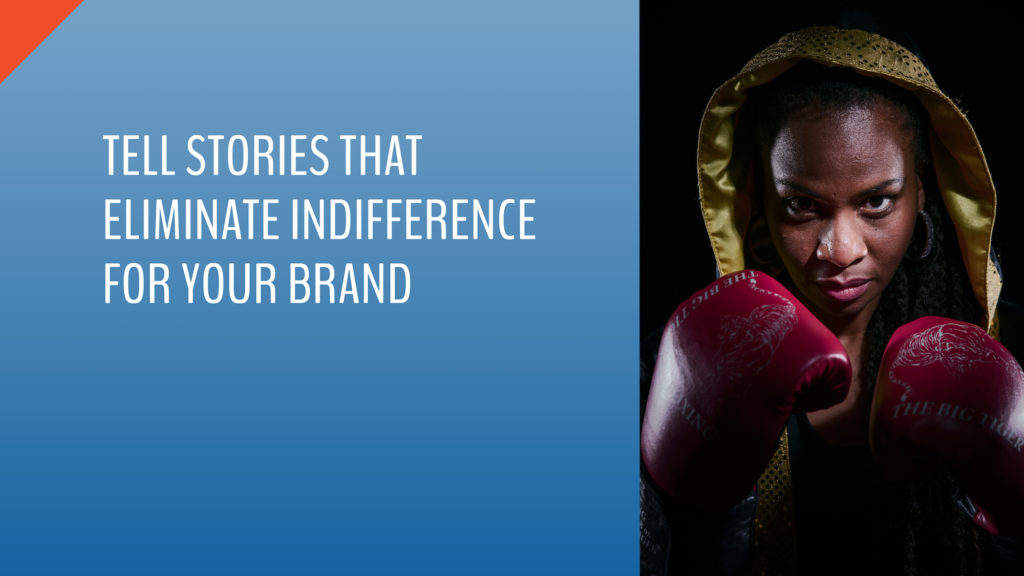Today we are talking about a simple strategy that businesses of all sizes can use to draw your ideal customers closer to you: Likeability.
And to dive into this topic, I chatted with Michael Katz, found of Blue Penguin Development and author of The Likeable Expert. We can learn a ton from Michael, including simple approaches to help you develop deeper, more emotional connections with the customers you serve.
Key points:
- Why the veil of “professionalism” can work against you in your quest to win customers
- Why many businesses struggle to be likeable (especially as they grow)
- How to position yourself as a likeable expert
- The biggest barrier most companies have with consistently delivering remarkable customer experiences
- A smart way to use pricing to develop a deeper degree of customer intimacy
- Why you should prioritize staying in front of the people you already know
- How to win your customers’ hearts
Listen to the 26-minute episode here:
Watch the episode here:
Read the transcript of the episode here:
The real reason your customers choose you
Sonia Thompson: Hello Michael, thank you so much for joining me today, how are you?
Michael Katz: I’m great. How are you?
Sonia: I’m doing well, all right, well let’s go ahead and dive right in. Tell me about your business, Blue Penguin Development.
Michael: Sure, so I’m a marketing coach, and I specialize in working with solo professionals. People who work by themselves, and people who sell a service, so attorneys, financial planners, consultants, coaches, writers, people who sell themselves essentially, those are my people.
Sonia: All right, and what is the specific problem that you solve for your people?
Michael: Well my focus is marketing, and I think the number one thing is always how do I get more clients and more of the right clients? Meaning the people I want to work with, and I think that is especially among my group of people, who are people who are really good at what they do. That thing they do has nothing to do with marketing, so the issue is always how do I get more clients so I can do the stuff I want to do?
For those of us who had a job as I did know well into my middle-age, it’s not something you’ve ever been taught. It often just feels very foreign, and so I coach people in a variety of ways, what they write, what they say, to make it work. Also, my approach is very much about making it authentic and natural and not feel creepy.
Sonia: Nobody likes creepy marketing. Now why do your customers choose you to help them solve this problem? There are plenty of marketing coaches out there and business coaches and all that kind of stuff. Why do they choose you?
Michael: Yeah, well it’s an interesting question, and actually I think it’s at the heart of everything I do, so just to back up a little bit. I spent 15 years in standard corporate America stuff doing marketing. In a big company, who you are as a person doesn’t have a lot to do with whether you get hired, or people buy your stuff, because we had advertising budgets and I had staff, and even though it was marketing, it was very much a numbers oriented thing, not a creative thing really.
When I went off to work on my own, I suddenly realized first of all nothing I knew had anything to do with getting clients as an individual. I also found that just to your point Sonia, it’s that everyone you compete with offers the same thing. If you’re a recruiter, you’re a financial planner, you’re a freelance writer. There’s all kinds of people who do the same thing, and so what I eventually realized was the reason you get hired is because people understand what you do, which for some people is hard, because they do something obscure.
People remember you, so-and-so says, “Hey, I need a writer,” or tomorrow you’re like, “I need a mechanic for my car,” you start asking people, “Who do you know?” You have to be remembered in that way. Then a key piece is what I found is likability, which again sounds so unbusinessy, not serious, but people refer and hire people they like. It’s not that I’m more likable than other people, although clearly I’m better looking, it’s that I’ve learned to be as authentic and real in my marketing as I can.
Whereas I find a lot of us hide all that behind this veil of professionalism, and so people can’t tell who they like and who’s different. What I’ve found is that if you can be as real as possible, and do, which I know we’ll talk about, likable things, you get more business. Soft and squishy, but it’s very predictable.
How likeability leads to remarkable customer experiences
Sonia: It makes a lot of sense, so I’m curious from you, what does a remarkable customer experience mean to you, and how does likability and authenticity factor into that?
Michael: Yeah, so I’m always focused on, and my clients fit into the same realm. What can we do that your larger competition can’t? If you compete with a bigger company, and it doesn’t have to be even huge, but if you’re a one person company competing with 100 person company, they want to do things that scale, that can be tracked. For example, I’m big on handwritten notes. You’re not going to get a handwritten note from the phone company no matter how nice they may try and be.
I’m big on what I think of as real communication, so again even as we just started the call, and you say, “Hi, how are you and all that?” That small thing, or asking how the weather is, you don’t get that when you talk to the phone company. In fact what you do get is the very canned, thank you for us being of service today, I hope you have a nice day. Someone is literally reading a script to thank you, because they’re concerned they’re not going to do right.
It’s not that the big companies are stupid, it’s that they can’t in some ways get out of their own way. They have to systematize things, and they have to do things that can scale, and so I am always trying to get people to do things, whether it’s gifts, or phone calls, or coffee with people who are geographically nearby, that’s the stuff your big competition will never do.
Sonia: Got it, and does that translate into a remarkable experience for your customers because they’re so not used to it?
Michael: Well it’s a funny thing, some people don’t want to deal with a small company. They want a large company, and I always say, “That’s okay, those aren’t your people.”
Sonia: Right.
Michael: The objective is not how do I get everyone on earth to work with me? That’s what Bank of America has to do, because their market literally is everyone on earth. What we’re trying to do is how do I find the people who are my people? The truth is, if you’re a small company all the way down to an individual, you need a tiny sliver of the market to be successful.
You really want to find people who connect with you in that way, and so what I’m trying to do in terms of likability, is again be as real as possible, but also make a personal connection with those people.
Sonia: Got it, and maintain I’m guessing that connection over time, so that you’re able to build and nurture that relationship I’m sure.
Michael: Yeah, and that’s easier said than done I find, because even though it may make complete sense this idea of be personal and connect, the problem with this whole call it relationship marketing, is it’s like exercise.
Sonia: Okay.
Michael: It takes time, you have to keep doing it, and you don’t usually get a result the day you do it.
Sonia: Right.
Michael: It’s rare that you send somebody a thank you note and they call you up and say, “We want to hire you.”
Sonia: Right.
Michael: However, what I’ve found in years of thank you notes and coffees and all this stuff, is that people come to you through these very obscure connections over time. It’s almost like you’re planting seeds that take time to grow. The hard part is, it’s real easy to stop doing it, because the note you send today, you’re not getting a client from that, or I had an email from a young guy just got out of college today.
“Can I come and buy you a cup of coffee?” I’m thinking of going into marketing.” That kid can’t help me one bit.
Sonia: Right.
Michael: Today, it’s easy for me to go, “No,” or just not even to respond to his email.
Sonia: Right.
Michael: My rule is you come to see me, I’ll have coffee with anybody, because I know most people aren’t going to do it, and I also know that, that kid has friends, parents, one day he’ll be someone who maybe hires me, but you have to have a certain faith in the process, because it takes a while.
How to build a company culture that oozes likeability
Sonia: Right, now along those lines, there is no matter how big your company is, a culture that you create. Whether you’re a one person company, you have a culture that you embody, and then if you’re a 10,000 person company, there is a culture that exists as well. What is the culture that you cultivate within your business that enables you to deliver the type of experience with your customers over time?
Especially as you said that whole likability aspect of it, which is your signature seems to be something that … It’s not something you do it today, and like you said you get a result tomorrow. What is the culture that you cultivate that enables you to whether you’re seeing those results are not, immediately to continue to do what you feel like is going to deliver that experience that you want?
Michael: Yeah, I use the phrase likable expert, and I actually often say to people that my marketing objective, is stay in front of the people you know over and over again in a way that positions you as a likable expert.
Sonia: Okay.
Michael: I think the key elements are they have to believe you’re good, so I don’t mean to suggest you don’t have to be good and it’s all about being a nice guy. Things like publishing content, the way you interact with people, the work you do with clients, that proves that you’re good at what you do. Most people though they stop there, they think it’s all about capability, and that if I said, “What makes you different?” They tend to go off on explaining, “Well I’m a little more this, I have this additional certification, or I’ve been doing it maybe a little bit longer.”
Not that, that’s not important, but you and I have a lot of difficulty discerning who’s better. You don’t even know where your doctor went to medical school. For all you know she didn’t, the truth is unless you’re getting a heart transplant tomorrow, it doesn’t matter. All these professionals are good. The likability part and the staying in front of people over and over again I find is a key piece.
That’s really my mantra, and so it causes me to do things. Even again when I get the email from the kid today, hey I’ve got stuff going on, I’m talking to you. It’s so easy to just blow past that, but because the culture of my organization, which is just me is likable expert, I try to be conscious to not walk past that stuff. Just another quick story, I was sitting in Starbucks two weeks ago and it’s super cold here in New England.
A guy walks in and announces to the 30 sitting of us there, “Does anybody have jumper cables?” Which, if you live in New England is a good idea. He’s literally standing right in front of me, and I’m having a conversation with a person. I have jumper cables in my car, I didn’t want to go out there in the cold and help this guy, but I really thought, “If you’re going to walk around the place telling people you’re the likable expert, you’re obligated to be helpful.”
It does guide things I do, and again I don’t think I have anymore inherent likability, but I do make a point of using that as a marketing tool, where I feel like a lot of people don’t take advantage of the human side.
Sonia: Right, and I like that your culture, your values that play into it, and your signature guides your actions. I think a lot of times people will say, “Well this is what we stand for, this is what we want to do, this is the culture that we want to create,” and there is a giant disconnect or a gulf between what they say they want and what they actually do, so I’m glad that you’re using it as your guiding star.
Michael: That’s a great point, you just reminded me, when I did have a job in a big company, I won’t name the name, but you’ve heard of them. We in the marketing department would develop our messaging and our vision statement based on what our research suggested our customers wanted us to be. It never occurred to us to go talk to the people delivering the service to see if it matched up. It was all about we’re going to say what you tell us you want, that’s what we are.
Sonia: Right.
Michael: As you said there was this huge disconnect between reality and the messaging.
Sonia: Yeah, and that’s never any good, never any good.
Michael: Yeah, not a good thing.
Sonia: All right, now what would you say the biggest barrier that you’ve experienced along the way that has limited your ability to deliver a remarkable experience for your customers?
Michael: I think it’s time, because I’m a one person company. I outsource things to assistants and tech people and all that, but I’m one person. I’ve been that way for 18 years, and I’ve no interest in growing. I like being this way, but the reality is you get busy, peaks and valleys are extreme when you work for yourself, and that’s when it’s really easy for me to stop doing things. I actually have this … I’m embarrassed to say paper to do list, it’s like a grid of all my stuff to do each week, like 10 outbound contacts to people that I already know.
I’m big on staying in touch with people I know, just to say, “Hey Sonia, how you doing?” Just to connect, one face-to-face meeting a week, coffee, lunch. Again it’s really easy to blow that stuff off, but because I’ve got this little checklist, I see if I’m doing it.
Sonia: Right.
Michael: Then maybe seven or eight other things. I’m not perfect at it, but because I’ve got these goals about how I’m going to continue with the likability stuff, I do it, but I have to say you get busy, and you’re like I’m not driving 20 minutes to go meet someone for coffee.
Sonia: Right, especially if it’s cold or something like that, yeah.
Michael: Yeah, but you know what? It’s amazing how often you’ll go meet somebody, and then a week later that person will BCC you on an email where they’re referring you to somebody else, it really does work.
How to develop a deeper degree of intimacy with your customers
Sonia: It’s good that you’ve got the goal for yourself of what it is that you want to do, because it does help you structure your time in the proper way, so that you can get those things done. Now, you spend a lot of time reaching out to your customers, maintaining that contact, etc. What do you do to maintain that level of intimacy with them that enables you to get insights into what it is that they’re going through in terms of how you might be able to use that to help them better?
It’s one thing to build a relationship and stay in contact with people, it’s another thing to actually really know them and have a deep degree of intimacy with them. What do you do to cultivate those relationships? I know you said it’s harder to do sometimes.
Michael: Right, this is going to sound strange, but a key change I made after being in business a couple of years, was I don’t charge by the hour anymore. I charge a flat fee for everything, you can’t hire me by the hour. I did that for a number of reasons, but one of the results which I did not anticipate was because I’m not charging by the hour, my clients are willing to shoot the breeze with me, talk about their weekend, or their dog, or how cold it is. If you’re charging by the hour, boy my accountant charges me by the hour and I get on the phone, “Hi, how’s it going?”
I just talk as fast as possible.
Sonia: Right.
Michael: Once I removed that, they share a lot more about who they are individually, and frankly they share more about what else is going on in their business, which leads to more business for me. It took the time pressure off, and also I realized I like shooting the breeze with people. If I could just do that all day I would do that, so that also led to this ability to be less strictly business and more connecting on a human level.
That’s made a huge difference, my clients are really without exception they’re all people I’d be very happy to go to lunch with. I don’t just do it because I’m supposed to do it, so that’s nice.
Sonia: Right, now as they’re opening up and doing all those things and sharing about what’s going on with their business, do you catalog those insights that you gather, so you can say, “Oh, I’m hearing this over and over and over again,” or do you keep them all in your head?
Michael: You mean for future conversations?
Sonia: For future conversations, or even product offerings that you might develop.
Michael: Okay, I definitely just keep them in my head, not that I’m suggesting this is the way to do it. I have a very just kind of wade into it approach. A lot of what I’m doing is coaching, and I find that I used to really worry if I had a call with someone … I typically would work with someone, we’ll talk once a week.
Sonia: Right.
Michael: I’d think a lot about it, and look at my old notes, and the more comfortable I got with it, I realized that I’m good at just wading into the conversation, and it just comes to me. That’s why I think I’m a good coach, so I’m not very systematic.
Sonia: Okay.
Michael: I don’t know that I recommend that, but it works for me.
Sonia: It’s been working for you. What are your three keys to success?
Michael: Well, so one is the likability piece. A second is I really focus on the people I already know. Not just clients, but my entire … Sorry my phone is ringing. My entire marketing approach is based on staying in front of the people I already know, and I mean a lot of times I’ll say to people when we talk about who do you already know? They think about clients and prospects, I’m talking about, my definition is anyone who if you called them up or emailed them, you wouldn’t have to introduce yourself.
Sonia: Okay.
Michael: That includes your college roommate and people you worked with 10 years ago. What I’m particularly good at is keeping those relationships alive. A lot of it’s just this sort of … I just emailed with a guy a couple of days ago, I don’t think I’ve seen him in 20 years, I just saw him go by in LinkedIn, we used to work together. I was like, “Oh John, how are you doing?” I’m very good at the, “Hey, how you doing?” Email, but again this stirring the pot of people you know is very productive.
It’s fine if you find me by Googling and you find your way to me, I don’t pay any attention to things like SEO. What I do is I stay in touch with those people, and the third thing, which relates to it, is I’ve published a newsletter every two weeks for 20 years. I like writing so it’s fun for me, but that newsletter also keeps me in front of people for years who I would easily have fallen off the radar. That’s why when I said to you my sentence earlier, stay in touch with the people you know over and over again.
I think you need some way to repeat it, it doesn’t have to be writing if you hate it, like just what you’re doing. You’ve got this audience of people who keep listening, so even if they don’t pay attention for six months, you just keep churning along, and then you hit them on the right day and they go, “Let’s talk.”
Sonia: Yeah, no, it’s true, it happens all the time. You’re staying in front of them that’s not obtrusive, because they’ve raised their hand and said that they want to hear from you on a regular basis. That always makes it helpful whenever you do honor your part of the agreement and provide helpful information for them on a regular.
Michael: Yeah, right, right.
Sonia: All right, well what can we expect to see from you in the future in terms of … I know the likable expert is your thing?
Michael: Well the biggest thing is I just a published book a couple of months ago called, “The Likable Expert: 121 Ways to Grow Your Business,” or something like that. That’s for me what I’m focusing on now, and I have to say for anyone who’s thinking of publishing a book, it’s gotten way easier than it used to be.
Sonia: For sure.
Michael: It’s nice, because if you … On that whole expert positioning thing, creating a book is something that people, whether it makes sense or not, actually assume wow she or he must be good if you do that.
Sonia: Right.
Michael: I find it’s kind of fun as well, it’s nice to have a physical thing when we all live in this virtual world.
Sonia: For sure, and where can people find you?
Michael: I have a page set up just for your listeners, michaelkatz.com/magnet.
Sonia: Perfecto.
Michael: They can find all about me.
Sonia: All right, and I will have all that information in the show notes. They can get more details about your book too, The Likable Expert.
Michael: Thanks very much.
Sonia: All right, well Michael this has been cool, and parting words of wisdom for businesses who want to consistently create remarkable customer experience for their customers?
Michael: Yeah, don’t be afraid to let the personal side commence your business. There’s a concern that I’m going to be seen as unprofessional if I talk about my dog in a presentation. What I have found is that that’s a pretend concern. If you’re in business you’re not going to become crazy, the much bigger problem is you’ll look like everybody else who does what you do. The real differentiator is not your skill, even though you need that, it’s the way you interact with people.
The more you can do that in a regular way, I find it leads to a lot more business. I find it’s much more pleasant than back in the days when I pretended to be business man Michael.
The way to your customers’ hearts
Sonia: For sure, all right, well speaking of personal, before I let you go, it doesn’t have to be super personal. I want to ask you one other question just to dig inside your head a little bit more, and that’s to deliver a line from a movie that speaks to you, and explain why you chose that one.
Michael: Yeah, I actually use this example all the time. It’s from this little obscure movie called, “Finding Forrester.” I don’t know if you’ve ever seen this movie.
Sonia: I’ve heard of it.
Michael: It’s a great movie. Sean Connery plays this reclusive writer who befriends this teenage boy. At one point the teenage boy is trying to date this girl in his class, and Sean Connery says to him, and I will not attempt a Scottish accent, so don’t worry. He says to him, “The way to a woman’s heart is to give her an unexpected gift at an unexpected time.”
That is very much my approach that what can you do that’s different? Even everybody sends their clients gifts at the holidays, I do it in May. I’m not going to do it when everyone else is doing it, or it’s out of the blue, it’s not usual, it’s something different. I find in marketing in general, what can you do that your competitors, whoever they may be would never think of doing? That’s why Sean Connery’s so famous.
Sonia: I like it, I like it, and of course it’s perfect for the show, because it’s all about how can you create that remarkable customer experience? You’ve got to do something that everybody else isn’t doing. It’s got to be unexpected.
Michael: Right, right.
Sonia: All right, this has been super cool, thank you so much for stopping by.
Michael: Thanks for having me.
Show notes:
Free Mini-Course: The Customer Magnet Playbook
Free Mini-Course: The Customer Magnet Playbook
7 Essential elements your business needs to consistently win more customers
- Framework based upon in the trenches experiences from 150+ business and thought leaders
- Science-based explanations to support why the elements of the blueprint work
- Action items to help you get some quick wins

